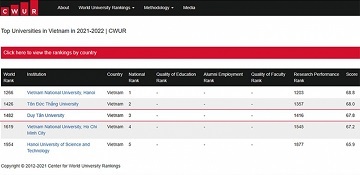
Do Van Dung, former rector of the HCMC University of Technology and Education
What did your successor ‘inherit’ when you retired?
Many rectors at public schools spend all the money at the end of their terms and the successors have to ‘do everything from the very beginning’. Some of them even face inherited debts.
But for me, the university with its thousands of officers and lecturers, and 26,000 students, is my second home. We still have VND300 billion in our fund, which makes my successor feel secure to run the school, and lecturers and officers to continue working.
However, the priceless thing I leave is the brand – the HCMC University of Technology and Education – with its outstanding training quality recognized by the whole society.
The school is now at a very high level thanks to educational philosophy: humanity, creativity, integration, continuous innovation, reform and sustainable development which we have been pursuing in the last 10 years.
The exam scores required by the HCMC University of Technology and Education from incoming students are the second highest among polytechnic schools, just after the HCMC University of Technology.
High-quality students, modern teaching methods, good lecturers, and good facilities all explain the increasingly improved quality of graduates. The graduates of our schools easily find good jobs.
|
We have more than 300 universities and more than 600 junior colleges in Vietnam, and at this moment, there are thousands of teachers that are giving lessons on the same topics. All teachers, including good and less good ones, and leading experts, have to prepare lesson plans. It is a big waste if they don’t share their materials," Do Van Dung, former rector of the HCMC University of Technology and Education |
Eight years ago, when I began my term as the school rector, the school still had debts. In the first years when we had to rely on the state budget, we had to save every dong. Later, thanks to autonomy, we made a breakthrough in resources.
The income of officers and lecturers has gradually improved. As the incomes of lecturers are high, we can retain and attract talented people.
We also make big investments in the school environment by building modern laboratories and practice workshops.
What is your contribution to this ‘property’?
The achievements created by collective efforts. We defined a philosophy and everyone agreed to follow the philosophy.
And I made contributions to the success. I called for support from businesses and sponsors because I believed that the support would help keep the tuition at the lowest possible level, which helps students a lot.
In 2020, despite Covid-19, we still received VND18 billion worth of equipment from businesses. In March 2021, we got another VND9 billion.
What was your biggest joy during the eight years of working as rector?
I feel satisfied as my efforts have been rewarded. The most joyful thing is that I can ensure a good income for lecturers, so that they can work with peace of mind.
The other thing that makes me feel happy is that graduates can find good jobs with high income. Of 26,000 students at the schools, many of them were from families with difficult conditions, but they found good jobs after graduation.
Do you have any regrets or worries?
I am an advocate for shared education. Sharing resources to practice thrift is a growing tendency in the world. E-hailing is also a kind of sharing economy.
In Vietnam, universities are still isolated castles, everyone for himself.
We have more than 300 universities and more than 600 junior colleges in Vietnam, and at this moment, there are thousands of teachers that are giving lessons on the same topics. All teachers, including good and less good ones, and leading experts, have to prepare lesson plans. It is a big waste if they don’t share their materials.
I asked myself why we don’t think of gathering the best lecturers from large universities to compile online lesson plans which can be shared among the community of lecturers.
Nowadays, with the development of digital technology, students from anywhere can turn on their computers to study theories. That is sharing learning materials and sharing teachers.
I thought about why my students have to travel 20 kilometers from District 5 to Thu Duc to study English, but not study at the HCMC University of Technology and Education, which is located in district 5, and why they travel from District 1 to Thu Duc, but not go to HCMC Economics University to study economics.
If universities cooperate with each other and recognize each other’s credits, students would be able to save two hours of traveling, thus saving time and money for themselves and for society.
What I am worried about is whether the philosophy of humaneness, i.e loving students like your own children, can continue. My students are still in difficult conditions, so we share difficulties with poor students. We offer air-conditioned bedrooms for students who don’t have places to sleep. And we keep the tradition of older students helping new students.
You are well known as the rector whose speech sometimes "rubs" against other individuals. What do you say about this?
I think educators need to be honest and frank. My frankness has helped education development very much. A lot of problems have been settled.
Le Huyen

Five Vietnamese universities make World University Rankings
A total of five local universities have been named among the global list of the world’s top 2,000 universities for the 2021 to 2022 edition, as released by the Center of World University Rankings (CWUR).

VN associate professor works at top university in Australia
As an associate professor at a top university in Australia, Hoang Lan Anh says that she was not a typical "dutiful child and excellent student" as valued in Vietnamese culture.
